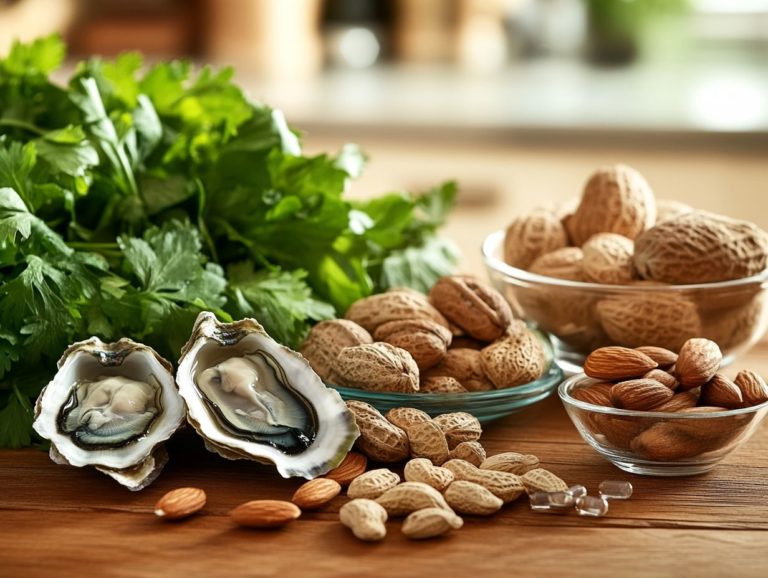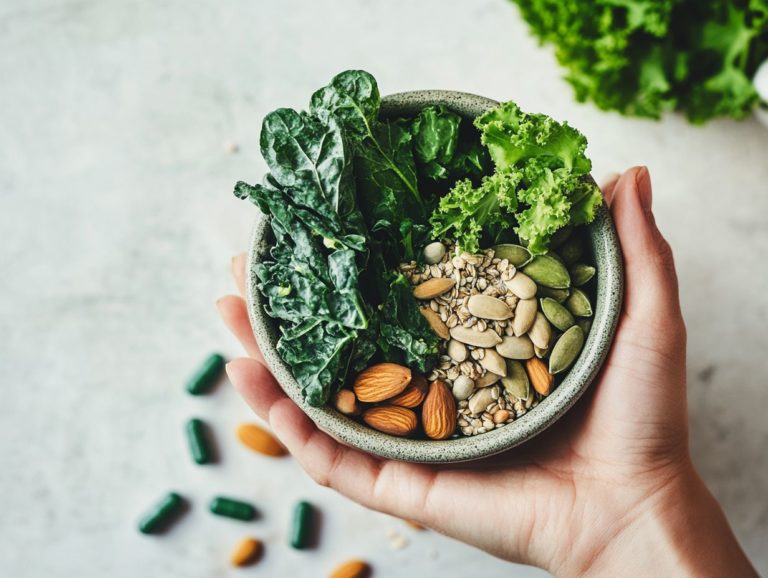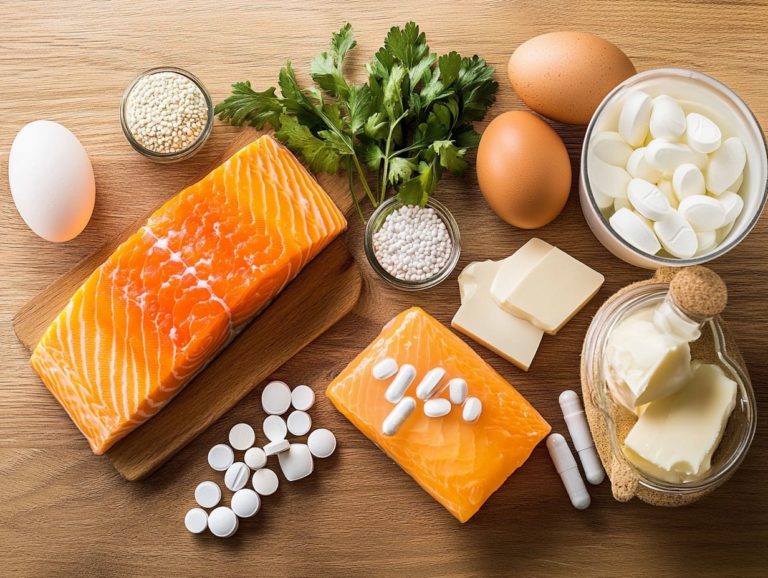Everything You Need to Know About Probiotics
Probiotics have emerged as a prominent term in health and wellness, boasting numerous benefits like enhanced digestion and a stronger immune function.
But what exactly are these tiny organisms, and how do they work in your body?
This article explores the definition and types of probiotics, their essential role in gut health, and the wide range of benefits they offer.
You ll also discover the best sources for adding probiotics to your diet, tips for choosing the right supplements, and possible side effects to watch out for.
Whether you re beginning your journey with probiotics or looking to deepen your knowledge, dive into this guide to unlock the amazing benefits of probiotics!
Contents
Key Takeaways:

- Probiotics are live microorganisms that can provide health benefits when consumed in adequate amounts.
- They help maintain a healthy balance of bacteria in your gut, improving digestion and boosting your immune system.
- You can find probiotics in foods like yogurt and fermented vegetables, or take them as supplements. It’s important to choose the right one for your specific needs.
What are Probiotics?
Probiotics are live microorganisms, mainly beneficial bacteria such as Lactobacillus and Bifidobacterium, that significantly improve your gut health by promoting a balanced community of bacteria.
These helpful microbes are crucial for various bodily functions, including digestion, immune support, and reducing inflammation.
As reputable institutions like the Cleveland Clinic and Mayo Clinic unveil new research, you may find it increasingly important to include probiotics in your daily routine through dietary supplements and fermented foods.
Definition and Types
Probiotics can be divided into distinct strains, each offering its own health advantages. You ll encounter strains like Lactobacillus, Bifidobacterium, and Saccharomyces boulardii, each with unique benefits.
Lactobacillus, for example, is well-known for supporting digestive health and boosting immunity, and is often found in yogurt and various fermented foods.
Bifidobacterium is essential for alleviating symptoms of irritable bowel syndrome (IBS) and can also be found in certain dairy products.
Then there s Saccharomyces boulardii, a beneficial yeast that effectively prevents and treats diarrhea, especially after antibiotic treatments.
These specific strains not only help maintain a balanced gut flora but also enhance nutrient absorption and aid in breaking down food. This highlights the significance of incorporating a diverse array of probiotics into your diet for a comprehensive health approach.
How Probiotics Work
Understanding how probiotics function is essential for appreciating their vital role in gut health and immune support.
They significantly influence the community of microorganisms in your gastrointestinal tract. By helping to restore balance especially after antibiotic use probiotics bolster your body s defenses against various pathogens while aiding digestion.
Understanding the Gut Microbiome
The gut microbiome is an extraordinary ecosystem made up of trillions of microorganisms, including beneficial microbes known as probiotics, which are crucial for your overall gut health.
This complex community does much more than assist with digestion; it also protects against harmful pathogens, supports your immune system, and can even influence your mental health and mood.
Maintaining a balance between helpful and harmful microbes is crucial. When this balance is disrupted, you may experience a variety of health issues, from inflammation and digestive disorders to metabolic complications.
Probiotics play a key role in restoring that balance by introducing beneficial strains that outcompete harmful microbes. By fostering a healthy gut environment, they help reduce inflammation and enhance digestive functions, showcasing the profound impact a well-balanced microbiome can have on your overall wellness.
Are you ready to discover how probiotics can transform your health? Consider exploring them further or consulting a health professional for personalized advice!
Benefits of Probiotics

The health benefits of probiotics are remarkable. They can significantly improve your gut health, boost your immune system, reduce inflammation, and even help prevent chronic diseases.
Research suggests that incorporating probiotics into your diet may reduce symptoms linked to digestive disorders like IBS. Embracing these little powerhouses could be a game-changer for your health journey.
Improving Digestive Health
Probiotics are well-known for enhancing digestive health. They nurture a balanced gut microbiome, helping to reduce symptoms of digestive disorders like IBS.
These beneficial bacteria outcompete harmful pathogens and produce substances that strengthen your gut lining. This process helps reduce common discomforts like bloating and gas, allowing you to enjoy your meals worry-free.
Incorporating probiotics into your routine can promote regularity for those facing challenges with constipation or inconsistent bowel movements. Discover tasty dietary sources rich in probiotics that you ll love:
- Yogurt
- Kefir
- Sauerkraut
Many supplements provide strains like Lactobacillus and Bifidobacterium, both shown to significantly enhance digestive wellness.
Boosting Immune System
One of the most significant benefits of probiotics is their ability to boost your immune system. They play an essential role in maintaining gut health and modulating inflammation.
A balanced gut microbiome is crucial for optimal immune function. Probiotics enhance the production of antibodies and cytokines vital components of your body’s defense mechanism. They also inhibit the growth of harmful bacteria, effectively reducing your risk of infections.
Studies show that individuals who supplement with probiotics experience fewer respiratory and gastrointestinal illnesses. By fostering diverse gut flora, probiotics not only support digestion but also play a crucial role in strengthening your immune response.
They are an essential addition for anyone looking to enhance their well-being.
Sources of Probiotics
You can obtain probiotics from a variety of sources, including fermented foods like yogurt and kefir. You can also find dietary supplements that provide specific strains of beneficial microbes.
Foods and Supplements
Foods rich in probiotics, such as yogurt, kefir, sauerkraut, and kombucha, are excellent allies for your gut health. Consider pairing these delicious foods with dietary supplements that deliver concentrated doses of beneficial microbes.
By incorporating these items into your daily diet, you can enhance your digestive function and overall wellness. Yogurt, with its creamy texture and delightful tang, stands out as a staple. Kefir offers a refreshing twist and a broader range of probiotic strains. Fermented cabbage varieties, such as sauerkraut, elevate your gut bacteria while providing essential vitamins and antioxidants. Then there s kombucha a fizzy treat packed with probiotics, making it a trendy favorite for many.
To maximize the benefits, consume these foods regularly. Pair them with fiber-rich ingredients to create a nourishing environment where probiotics can thrive.
Choosing the Right Probiotic Supplement
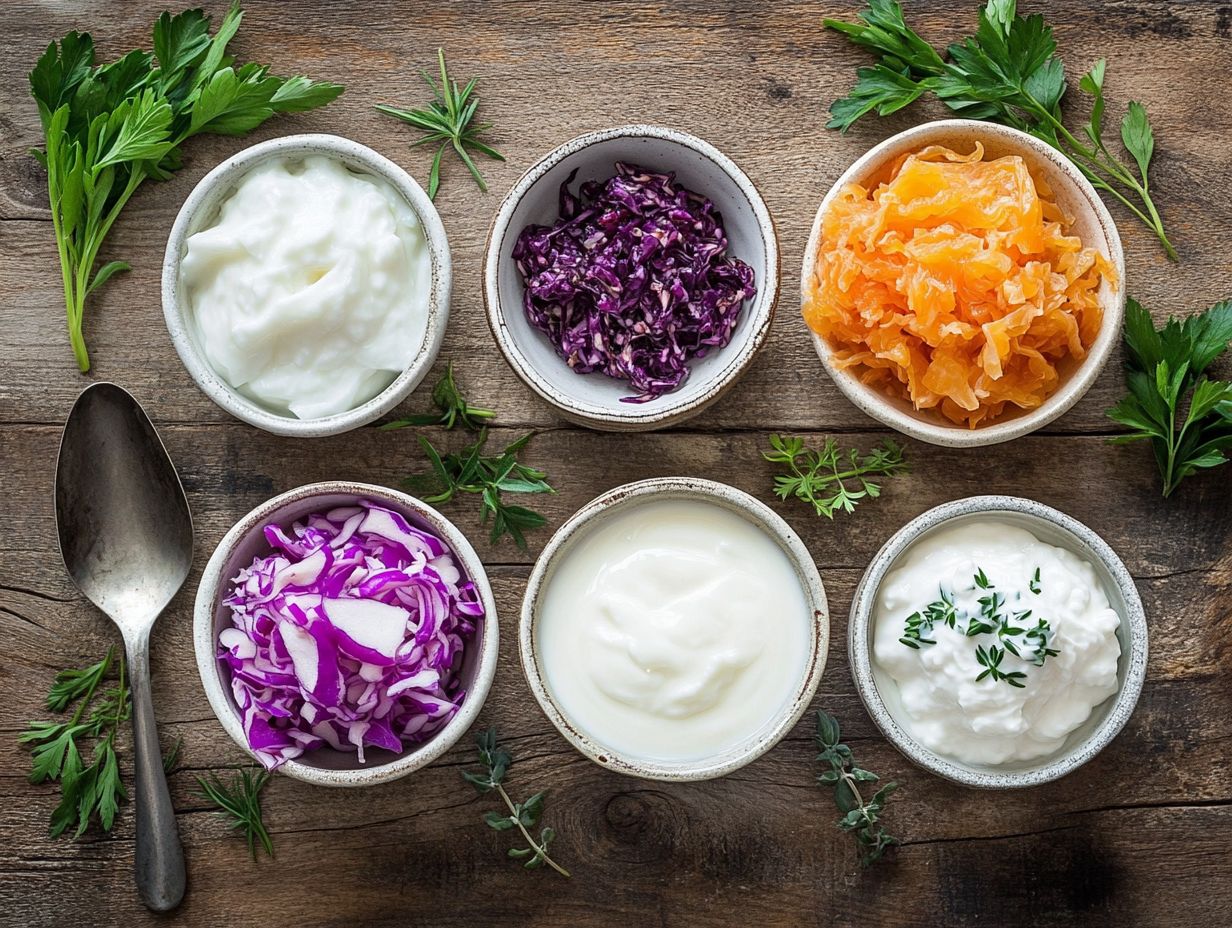
When selecting a probiotic supplement, check the specific strains and their health benefits. Ensure that the dosage fits your health needs.
Factors to Consider
When selecting probiotic supplements, evaluate several factors. Look into the specific strains available, the CFU count (the number of active bacteria), and the intended health benefits.
Understanding strain diversity is vital. Different strains can target various health issues, from digestive comfort to immune support.
The recommended dosages are equally important. Adhering to expert guidelines or consulting healthcare professionals can help you determine effectiveness.
Shelf stability is another critical consideration. Some probiotics require refrigeration to maintain potency, while others thrive at room temperature.
When examining labels, seek out products specifying live cultures and a clear CFU count. This ensures the supplement aligns with your health needs. Always prioritize high-quality brands that are transparent about their testing and manufacturing processes. This transparency significantly enhances your confidence in your choice.
Potential Side Effects of Probiotics
Although probiotics are largely regarded as safe, it’s essential to be aware of potential side effects and adverse reactions. This is especially true for individuals with underlying health conditions or those taking certain medications.
Possible Adverse Reactions
Possible adverse reactions to probiotics may include digestive discomfort, increased gas, and bloating. This is particularly true for individuals with pre-existing digestive disorders.
These effects can be more pronounced if you have irritable bowel syndrome (IBS) or other gastrointestinal conditions. Certain populations, especially those with weakened immune systems or serious health issues, should approach probiotic use with caution.
If you’re thinking about trying probiotics, talk to your healthcare provider first! By discussing your unique health situation, you can ensure these dietary supplements are safe and tailored to your needs, minimizing the risk of adverse reactions.
Frequently Asked Questions
What are probiotics and why are they important?
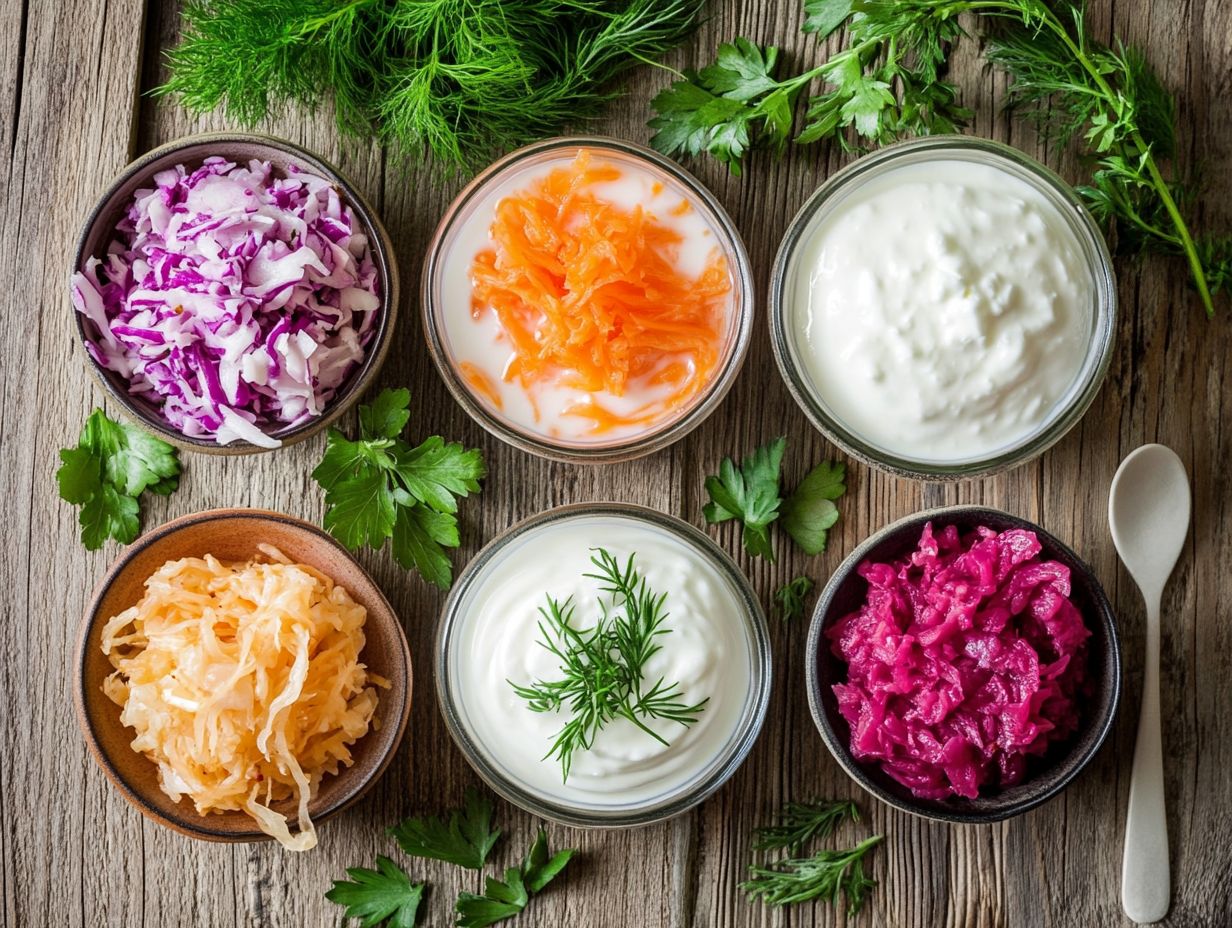
Probiotics are live microorganisms that provide health benefits when consumed. They help maintain a healthy balance of bacteria in the gut, essential for proper digestion and overall health.
What are the most common types of probiotics?
The most common types of probiotics are Lactobacillus and Bifidobacterium. These bacteria are naturally found in the human gut and have been extensively studied for their health benefits.
What foods contain probiotics?
Fermented foods such as yogurt, kefir, sauerkraut, kimchi, and kombucha are excellent sources of probiotics. Some dairy products, like cheese and buttermilk, also contain probiotics. You can also find probiotic supplements in capsule, powder, or liquid form.
What are the health benefits of probiotics?
Probiotics have been shown to improve digestion, strengthen the immune system, and promote overall gut health. They may also help treat certain digestive disorders, prevent infections, and even improve mental health.
Are there any potential side effects of taking probiotics?
In most cases, probiotics are safe for consumption. However, some individuals may experience mild side effects such as gas, bloating, or upset stomach. If you experience any discomfort, consult with a healthcare professional immediately.
Can anyone take probiotics?
Generally, probiotics are safe for most people. However, those with a weakened immune system or serious health conditions should consult their doctor before taking probiotic supplements. Pregnant or breastfeeding women should also talk to their healthcare provider before starting probiotics.



